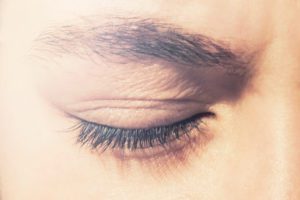
Medically Reviewed by Brett Katzen, MD, FACS
How to Recognize & Treat Eye Damage From the Sun
Home / Vision Education Center /
Last Updated:

Medically Reviewed by Brett Katzen, MD, FACS
Table of Contents
The UV rays of the sun don’t just damage your skin. They can damage your eyes as well.
There are three types of UV rays: UVC, UVB, and UVA. UVB rays are usually what causes the most significant damage to the eyes and skin.
It can be difficult to detect when the sun might be damaging your eyes, but if your eyes are hurting as you look near the sun (even if you’re not looking directly at it), it could be the sign of a problem. Ultraviolet keratitis is a generally temporary condition that can result from staring at the sun too long, causing a variety of eye issues.
In the long term, if your eyes are exposed to too much sunlight, it can lead to cataracts and other eye diseases. It can even lead to cancer.
Reversing sun damage is not always possible. If the damage is not severe, you should give your eyes a break from the sun if you are concerned. Adopt better practices to protect them, and do not go out when it is sunny unless necessary. If your damage is serious, you may need surgery to correct it. In some cases, the damage may be irreparable.
Avoiding sun damage to your eyes in the first place is the best way to prevent serious issues. Wearing a hat and sunglasses when going out in the day, especially if you will be outside for a long time, is the best solution to avoiding eye damage.
While you’re adopting safe practices, remember to properly protect your skin with sunscreen.
Sun Damage
The sun is a relatively powerful source of ultraviolet (UV) radiation, which can cause damage if you are not careful. At its worst, overexposure to UV rays can increase your risk of developing a number of eye diseases, including cataracts, growths on the eye, and cancer.

There are three categories of UV radiation to take into consideration.
- UVC: While these types of rays have the highest potential for harm in theory, the earth’s ozone layer blocks virtually all of them. The depletion of the ozone is the only reason we are exposed to this type of radiation.
- UVB: Only partially filtered out by the ozone layer, these slightly weaker rays are what creates a suntan. In high doses, they can cause a number of issues for your skin and eyes.
- UVA: These weak rays of UV radiation are not as frequently associated with major eye or skin problems; however, they can pass through the cornea. Evidence suggests they may cause some types of cataracts and macular degeneration.
You deserve clear vision. We can help.
With 135+ locations and over 2.5 million procedures performed, our board-certified eye surgeons deliver results you can trust. Your journey to better vision starts here.
Symptoms
The risk that the sun will damage your eyes is cumulative. The longer you spend with your eyes exposed to UV rays, the greater the risk of an issue.
It may not always be obvious when you are being exposed to too much sunlight. One simple rule of thumb to follow: If you are looking anywhere near the sun and it is hurting your eyes, you are being overexposed.
Perhaps one of the most obvious signs you have been overexposed to the sun is if you develop ultraviolet keratitis. This could be compared to sunburn of the cornea, with symptoms generally lasting from 6 to 24 hours, although they can last as long as 48 hours.
Symptoms include the following:
- Discomfort or redness in the eyes
- Tears
- Blurry vision
- Swelling
- Light sensitivity
- Eyelid twitching
- Gritty feeling in the eyes
- Short-term loss of vision
- Seeing halos
If you are experiencing serious vision loss or any loss of vision that does not improve in a few hours, contact a specialist to make sure your eyes are okay.
Again, cumulative long-term exposure to solar radiation increases your risk for a number of eye diseases. The most common are macular degeneration and cataracts, but cancer and eye growths are also possibilities.
Reversing Sun Damage
Damage to the eye can sometimes be permanent or at least semi-permanent, with some symptoms fading but not completely. If you have any reason to believe your eyes have been overexposed to the sun (which is common with people who are often outdoors, such as farmers), you should wear sunglasses and a hat regularly. This ideally will give your eyes time to heal.

Also, see a specialist and see what your options are. Depending on the severity of your damage and your particular situation, surgery to improve your vision may or may not be an option. Prescription eye drops may also be necessary.
You deserve clear vision. We can help.
With 135+ locations and over 2.5 million procedures performed, our board-certified eye surgeons deliver results you can trust. Your journey to better vision starts here.
Avoidance Is Key
Rather than risk permanent damage, it is best to learn to avoid overexposure to the sun. Familiarizing yourself with the UV index can help you stay safe.
- UV 2 or less: Wear sunglasses, and consider sunscreen.
- UV 3-5: Wear sunglasses, cover up, use sunscreen, and avoid the sun when it is strongest at midday.
- UV 6-7: Wear a hat and sunglasses, cover up, and use sunscreen. Avoid the sun if possible between 10 a.m. and 4 p.m.
- UV 8-10: Follow the same guidelines as UV 6-7.
- UV 11+: Wear a hat and sunglasses, and reapply sunscreen (SPF 15+) every two hours. Try to totally avoid sun exposure between 10 a.m. and 4 p.m. if possible.
Broadly speaking, wearing sunglasses and a hat will never hurt. Sunscreen is also generally a good idea. If the sun can hurt your eyes, it can also hurt your skin.
Remember that clouds are not an excuse to stare in the direction of the sun. Clouds do not block enough of the sun’s rays to mitigate harm.
Can Sunscreen For Your Face Also Protect Your Eyes?
Facial sunscreen can provide a safe degree of anti-UV protection when applied on and around the eyelids. It doesn’t usually pose any danger to your eyes, especially if it’s made with mineral ingredients like titanium dioxide.
However, it isn’t enough to just wear only sunscreen you spend long hours in the sun. Sunscreen formulas are manufactured to protect only the skin around your eyes—and not the eyes.
Sunscreen can’t block harmful radiation from reaching and damaging your eyes. That’s why you should incorporate a broad-brimmed hat and anti-UV sunglasses for maximum eye protection against sun damage.
Sunglasses For UV Protection
All sunglasses are not the same. Many dark lens options on the market may block out ambient light and still expose you to harmful UV rays.
To gain maximum coverage and benefit from your sunglasses, make sure the ones you wear are designed to protect your eyes from the sun. Check the product label for the level of UVA and UVB protection provided.
Some of the safest sunglasses boast UV 400 coverage, which amounts to nearly 100% protection against hazardous sun rays.
You deserve clear vision. We can help.
With 135+ locations and over 2.5 million procedures performed, our board-certified eye surgeons deliver results you can trust. Your journey to better vision starts here.
References
- The Sun, UV Radiation and Your Eyes. (August 24, 2014). American Academy of Ophthalmology.
- UV and Sunglasses: How to Protect Your Eyes. (April 2019). All About Vision.
- Ultraviolet Keratitis. (April 25, 2015). Cleveland Clinic.
- Ask the Expert: Can You Safely Use Sunscreen Around Your Eyes? If so, What Kind Would Be Best? Skin Cancer Foundation. Date Fetched: July 29, 2021
- How to Tell if Your Sunglasses are Really Protecting Your Eyes. The University of Utah. Date Fetched: July 29, 2021

Preparing to follow in his father’s footsteps, Dr. Brett Katzen obtained his undergraduate degree from University of Delaware, graduating magna cum laude in 1984. He received his medical degree from Jefferson Medical College in 1988 and completed his residency in ophthalmology at the University of Maryland School of Medicine. Brett officially joined the Katzen Eye Group in 1992, although he was a familiar sight at the practice long before then.
This content is for informational purposes only. It may have been reviewed by a licensed physician, but is not intended to serve as a substitute for professional medical advice. Always consult your healthcare provider with any health concerns. For more, read our Privacy Policy and Editorial Policy.